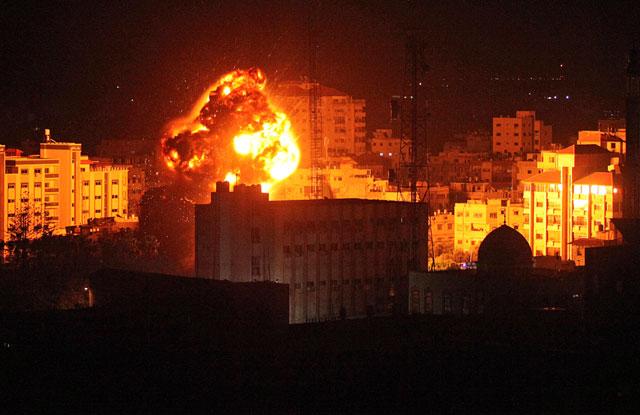You are here
Israel-Hamas truce: will it last?
By AFP - May 06,2019 - Last updated at May 06,2019

This photo taken on Monday shows a building in Gaza City that was destroyed during Israeli air strikes on Gaza City (AFP photo)
OCCUPIED JERUSALEM — Israel and Palestinian militants in the Gaza Strip agreed a ceasefire on Monday after a two-day flare-up that brought them to the brink of war, but analysts remain unconvinced any truce will last.
What happened?
On Friday two Israeli soldiers were shot and injured during protests and clashes along the Gaza border. Israel blamed the attack on an Islamic Jihad sniper.
In response Israel struck a base of the strip's Islamist rulers Hamas, killing two fighters.
Beginning Saturday morning, Hamas and its allied group Islamic Jihad fired hundreds of rockets at Israel from Gaza, causing tens of thousands to flee to bomb shelters.
Israel retaliated with tank and air strikes in the strip, hitting around 350 targets throughout the weekend.
The situation escalated further on Sunday, with four Israeli civilians killed by rockets.
Over the course of two days the Israeli army said more than 690 rockets and mortars were fired from Gaza.
In total 25 Palestinians were killed in Gaza, including two pregnant women and three children, according to Gaza health authorities.
Israel disputed responsibility for the death of one woman and a baby, saying they were killed by a Palestinian rocket that misfired.
At least nine of the Palestinians killed were identified as members of militant groups.
Early on Monday morning Palestinian factions said a deal had been reached to restore calm after Egyptian mediation.
Israel declined to comment on the deal, but there were no reports of rocket fire or air strikes.
What is the background?
Israelis and Palestinians could be forgiven for feeling a strong sense of deja vu.
Israel has fought three wars with Hamas and Islamic Jihad in Gaza since 2008, the most recent in 2014.
Since that last war, there have been multiple flare-ups that have threatened to tip over into full-bown conflict.
As recently as March, hundreds of rockets were fired from the strip, with Israel striking dozens of targets there.
Another round last November led to the resignation of defence minister Avigdor Lieberman, who accused right-wing Israeli Prime Minister Benjamin Netanyahu of being soft on Hamas.
Many analysts say that neither Hamas nor Israel want another war, but both face pressures that could lead them into one.
What does the
truce involve?
Palestinian officials said the agreement on Monday was to implement what was agreed in November after that round of hostilities.
At the time, Hamas officials said Israel had agreed to ease its crippling blockade of Gaza in exchange for calm.
Israel says the restrictions are necessary to isolate Hamas and stop it from obtaining materials to make weapons, but critics say it amounts to collective punishment of 2 million people in the strip.
The deal was supposed to see Israel allow large amounts of Qatari funds and fuel into the strip, as well as facilitating projects to redevelop infrastructure in the strip in later phases.
Israel never publicly confirmed the unwritten agreement.
Hamas official Ismail Radwan told AFP Monday's deal involved Israeli concessions on the zone it allows for fishermen off the strip as well as on fuel and other issues for Gaza.
Hamas and Jihad have been frustrated by the slow implementation of the deal, according to Tareq Baconi, analyst with the International Crisis Group think tank.
"Hamas believes they have done everything they committed to under the ceasefire agreement but no aid has materialised," he said.
"The two parties seem to be stuck in the first phase of this ceasefire agreement."
What have been
the reactions?
Netanyahu, still trying to form a coalition government after winning last month's elections, has faced serious criticism over his handling of Gaza.
Opposition leader Benny Gantz, a former army general, accused Netanyahu of "capitulation" to Hamas.
While the parties he is seeking to form a rightwing coalition government with have largely remained quiet, Netanyahu will face pressure to show he is being tough on Hamas.
One of those he needs to convince to join his government is Lieberman, who is likely to push for a hard line.
What's next?
Israel is due to host the Eurovision song contest next week in what Israel sees as a major event.
"A Eurovision contest might actually have saved the parties from escalating," Baconi said.
"But I think a war is more likely than ever after Netanyahu forms his government, and that what we have seen in the past few days won't necessarily be forgotten."
Hugh Lovatt, Israel-Palestine analyst at the European Council of Foreign Relations think tank, agreed that tensions remained high.
"There is little reason to believe that this new understanding reached between Hamas and Israel will be any different, or any longer lasting, than the previous deals reached over the past months," he said.
"Absent a more permanent political solution for Gaza we will likely see renewed flare-ups of violence."
Related Articles
GAZA CITY, Palestinian Territories — Israel launched strikes on Hamas targets in Gaza on Monday hours after a rocket from the Palestinian en
GAZA CITY — Israeli raids on Gaza following its targeted killing of a top Islamic Jihad commander in the besieged enclave raged for a second
OCCUPIED JERUSALEM — Prime Minister Benjamin Netanyahu said Tuesday he was prepared for further military action in Gaza after cutting short



















